Professional Development Plan: Senior Nurse in Dementia Care
VerifiedAdded on 2020/12/29
|12
|4038
|409
Report
AI Summary
This report focuses on the professional development of a senior nurse specializing in dementia care. It explores the importance of continuous learning, identifies potential barriers to professional growth, and compares various sources of support for development. The report details factors to consider when selecting professional development opportunities and activities. It then evaluates knowledge and performance against standards and benchmarks, and prioritizes development goals. Furthermore, it examines learning opportunities aligned with personal learning styles, outlines a professional development plan, and assesses its effectiveness. The report concludes by comparing models of reflective practice and emphasizes its role in improving performance, incorporating feedback, and evaluating practices for continuous improvement. The document provides a comprehensive overview of the strategies and considerations essential for a senior nurse to enhance their skills, knowledge, and overall performance within the healthcare setting.
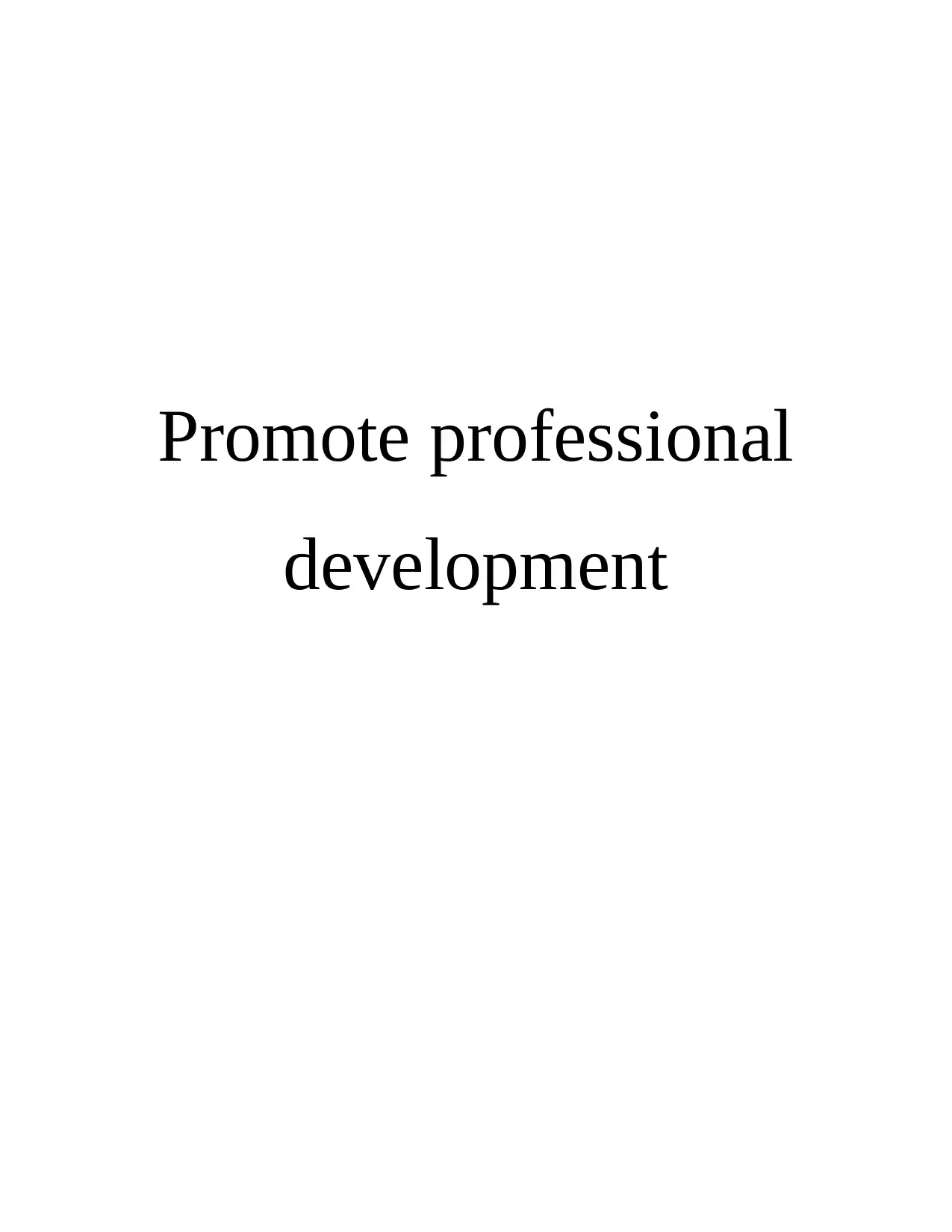
Promote professional
development
development
Paraphrase This Document
Need a fresh take? Get an instant paraphrase of this document with our AI Paraphraser
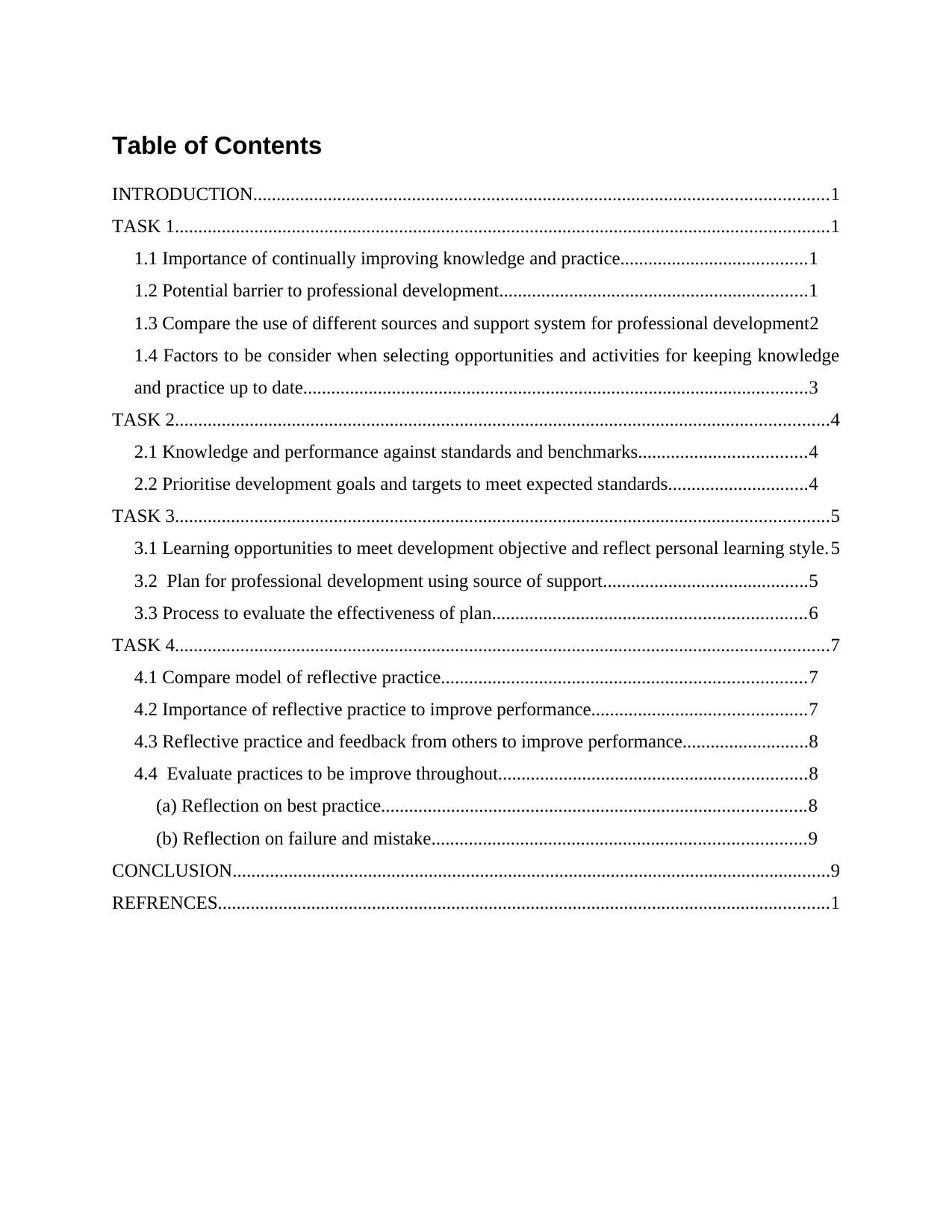
Table of Contents
INTRODUCTION...........................................................................................................................1
TASK 1............................................................................................................................................1
1.1 Importance of continually improving knowledge and practice........................................1
1.2 Potential barrier to professional development..................................................................1
1.3 Compare the use of different sources and support system for professional development2
1.4 Factors to be consider when selecting opportunities and activities for keeping knowledge
and practice up to date............................................................................................................3
TASK 2............................................................................................................................................4
2.1 Knowledge and performance against standards and benchmarks....................................4
2.2 Prioritise development goals and targets to meet expected standards..............................4
TASK 3............................................................................................................................................5
3.1 Learning opportunities to meet development objective and reflect personal learning style.5
3.2 Plan for professional development using source of support............................................5
3.3 Process to evaluate the effectiveness of plan...................................................................6
TASK 4............................................................................................................................................7
4.1 Compare model of reflective practice..............................................................................7
4.2 Importance of reflective practice to improve performance..............................................7
4.3 Reflective practice and feedback from others to improve performance...........................8
4.4 Evaluate practices to be improve throughout..................................................................8
(a) Reflection on best practice...........................................................................................8
(b) Reflection on failure and mistake................................................................................9
CONCLUSION................................................................................................................................9
REFRENCES...................................................................................................................................1
INTRODUCTION...........................................................................................................................1
TASK 1............................................................................................................................................1
1.1 Importance of continually improving knowledge and practice........................................1
1.2 Potential barrier to professional development..................................................................1
1.3 Compare the use of different sources and support system for professional development2
1.4 Factors to be consider when selecting opportunities and activities for keeping knowledge
and practice up to date............................................................................................................3
TASK 2............................................................................................................................................4
2.1 Knowledge and performance against standards and benchmarks....................................4
2.2 Prioritise development goals and targets to meet expected standards..............................4
TASK 3............................................................................................................................................5
3.1 Learning opportunities to meet development objective and reflect personal learning style.5
3.2 Plan for professional development using source of support............................................5
3.3 Process to evaluate the effectiveness of plan...................................................................6
TASK 4............................................................................................................................................7
4.1 Compare model of reflective practice..............................................................................7
4.2 Importance of reflective practice to improve performance..............................................7
4.3 Reflective practice and feedback from others to improve performance...........................8
4.4 Evaluate practices to be improve throughout..................................................................8
(a) Reflection on best practice...........................................................................................8
(b) Reflection on failure and mistake................................................................................9
CONCLUSION................................................................................................................................9
REFRENCES...................................................................................................................................1
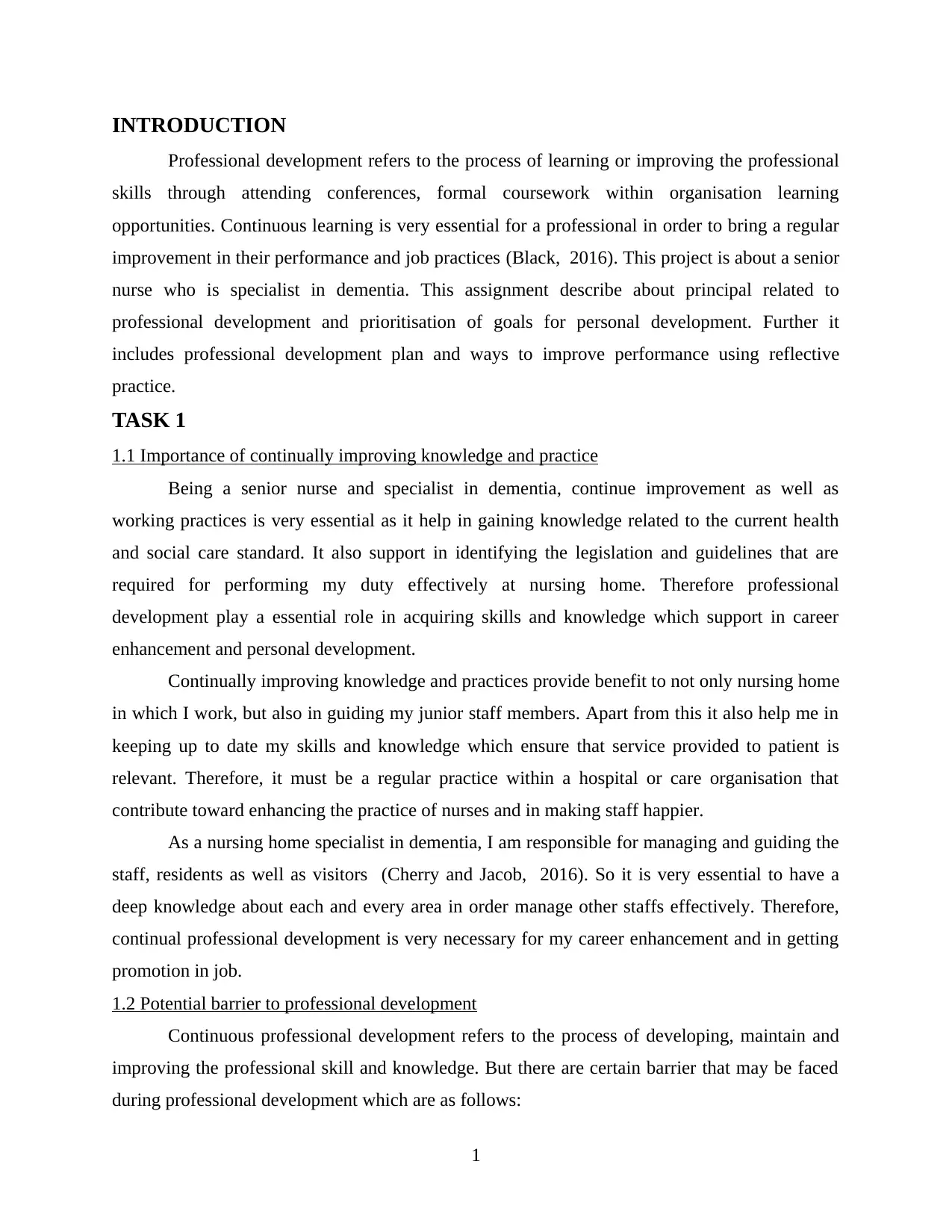
INTRODUCTION
Professional development refers to the process of learning or improving the professional
skills through attending conferences, formal coursework within organisation learning
opportunities. Continuous learning is very essential for a professional in order to bring a regular
improvement in their performance and job practices (Black, 2016). This project is about a senior
nurse who is specialist in dementia. This assignment describe about principal related to
professional development and prioritisation of goals for personal development. Further it
includes professional development plan and ways to improve performance using reflective
practice.
TASK 1
1.1 Importance of continually improving knowledge and practice
Being a senior nurse and specialist in dementia, continue improvement as well as
working practices is very essential as it help in gaining knowledge related to the current health
and social care standard. It also support in identifying the legislation and guidelines that are
required for performing my duty effectively at nursing home. Therefore professional
development play a essential role in acquiring skills and knowledge which support in career
enhancement and personal development.
Continually improving knowledge and practices provide benefit to not only nursing home
in which I work, but also in guiding my junior staff members. Apart from this it also help me in
keeping up to date my skills and knowledge which ensure that service provided to patient is
relevant. Therefore, it must be a regular practice within a hospital or care organisation that
contribute toward enhancing the practice of nurses and in making staff happier.
As a nursing home specialist in dementia, I am responsible for managing and guiding the
staff, residents as well as visitors (Cherry and Jacob, 2016). So it is very essential to have a
deep knowledge about each and every area in order manage other staffs effectively. Therefore,
continual professional development is very necessary for my career enhancement and in getting
promotion in job.
1.2 Potential barrier to professional development
Continuous professional development refers to the process of developing, maintain and
improving the professional skill and knowledge. But there are certain barrier that may be faced
during professional development which are as follows:
1
Professional development refers to the process of learning or improving the professional
skills through attending conferences, formal coursework within organisation learning
opportunities. Continuous learning is very essential for a professional in order to bring a regular
improvement in their performance and job practices (Black, 2016). This project is about a senior
nurse who is specialist in dementia. This assignment describe about principal related to
professional development and prioritisation of goals for personal development. Further it
includes professional development plan and ways to improve performance using reflective
practice.
TASK 1
1.1 Importance of continually improving knowledge and practice
Being a senior nurse and specialist in dementia, continue improvement as well as
working practices is very essential as it help in gaining knowledge related to the current health
and social care standard. It also support in identifying the legislation and guidelines that are
required for performing my duty effectively at nursing home. Therefore professional
development play a essential role in acquiring skills and knowledge which support in career
enhancement and personal development.
Continually improving knowledge and practices provide benefit to not only nursing home
in which I work, but also in guiding my junior staff members. Apart from this it also help me in
keeping up to date my skills and knowledge which ensure that service provided to patient is
relevant. Therefore, it must be a regular practice within a hospital or care organisation that
contribute toward enhancing the practice of nurses and in making staff happier.
As a nursing home specialist in dementia, I am responsible for managing and guiding the
staff, residents as well as visitors (Cherry and Jacob, 2016). So it is very essential to have a
deep knowledge about each and every area in order manage other staffs effectively. Therefore,
continual professional development is very necessary for my career enhancement and in getting
promotion in job.
1.2 Potential barrier to professional development
Continuous professional development refers to the process of developing, maintain and
improving the professional skill and knowledge. But there are certain barrier that may be faced
during professional development which are as follows:
1
⊘ This is a preview!⊘
Do you want full access?
Subscribe today to unlock all pages.

Trusted by 1+ million students worldwide
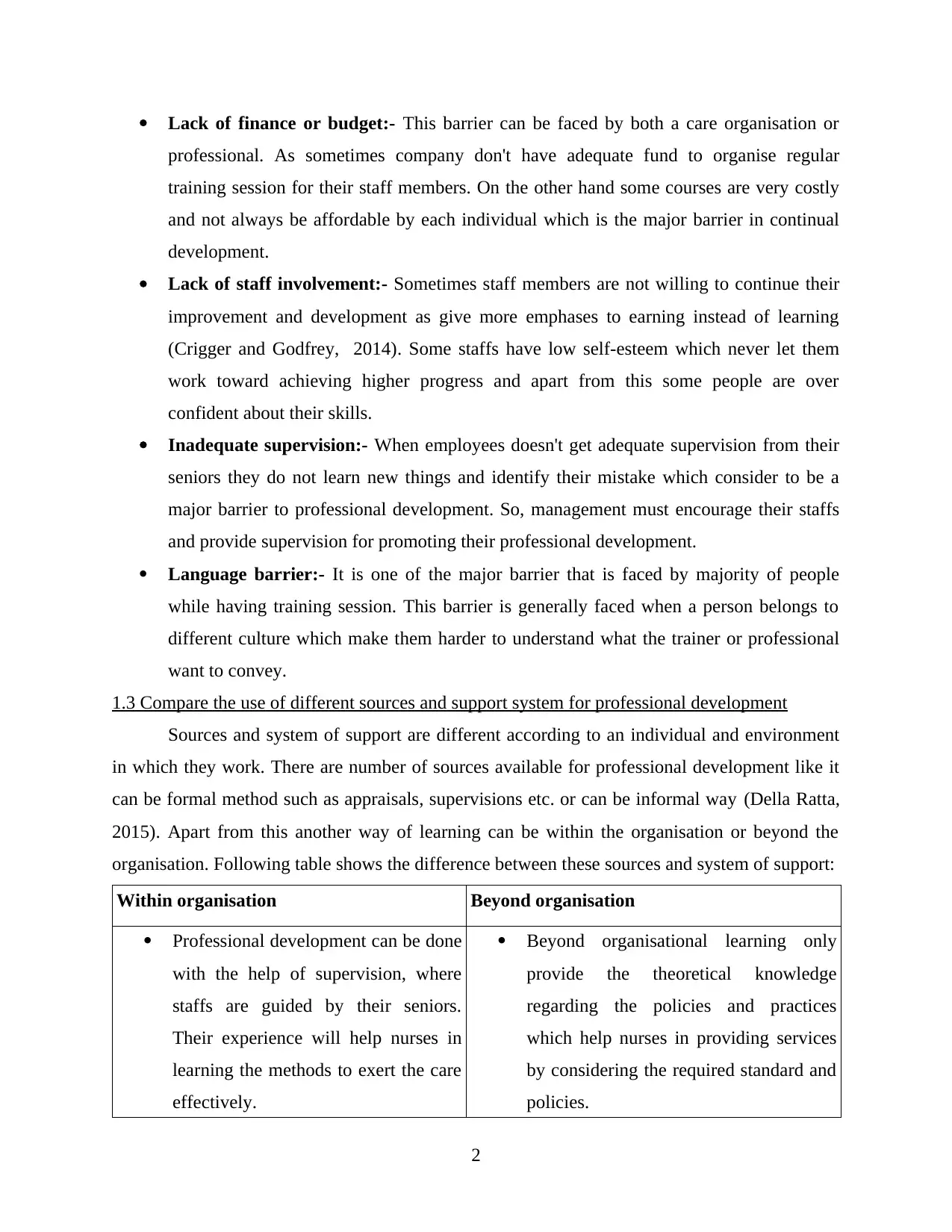
Lack of finance or budget:- This barrier can be faced by both a care organisation or
professional. As sometimes company don't have adequate fund to organise regular
training session for their staff members. On the other hand some courses are very costly
and not always be affordable by each individual which is the major barrier in continual
development.
Lack of staff involvement:- Sometimes staff members are not willing to continue their
improvement and development as give more emphases to earning instead of learning
(Crigger and Godfrey, 2014). Some staffs have low self-esteem which never let them
work toward achieving higher progress and apart from this some people are over
confident about their skills.
Inadequate supervision:- When employees doesn't get adequate supervision from their
seniors they do not learn new things and identify their mistake which consider to be a
major barrier to professional development. So, management must encourage their staffs
and provide supervision for promoting their professional development.
Language barrier:- It is one of the major barrier that is faced by majority of people
while having training session. This barrier is generally faced when a person belongs to
different culture which make them harder to understand what the trainer or professional
want to convey.
1.3 Compare the use of different sources and support system for professional development
Sources and system of support are different according to an individual and environment
in which they work. There are number of sources available for professional development like it
can be formal method such as appraisals, supervisions etc. or can be informal way (Della Ratta,
2015). Apart from this another way of learning can be within the organisation or beyond the
organisation. Following table shows the difference between these sources and system of support:
Within organisation Beyond organisation
Professional development can be done
with the help of supervision, where
staffs are guided by their seniors.
Their experience will help nurses in
learning the methods to exert the care
effectively.
Beyond organisational learning only
provide the theoretical knowledge
regarding the policies and practices
which help nurses in providing services
by considering the required standard and
policies.
2
professional. As sometimes company don't have adequate fund to organise regular
training session for their staff members. On the other hand some courses are very costly
and not always be affordable by each individual which is the major barrier in continual
development.
Lack of staff involvement:- Sometimes staff members are not willing to continue their
improvement and development as give more emphases to earning instead of learning
(Crigger and Godfrey, 2014). Some staffs have low self-esteem which never let them
work toward achieving higher progress and apart from this some people are over
confident about their skills.
Inadequate supervision:- When employees doesn't get adequate supervision from their
seniors they do not learn new things and identify their mistake which consider to be a
major barrier to professional development. So, management must encourage their staffs
and provide supervision for promoting their professional development.
Language barrier:- It is one of the major barrier that is faced by majority of people
while having training session. This barrier is generally faced when a person belongs to
different culture which make them harder to understand what the trainer or professional
want to convey.
1.3 Compare the use of different sources and support system for professional development
Sources and system of support are different according to an individual and environment
in which they work. There are number of sources available for professional development like it
can be formal method such as appraisals, supervisions etc. or can be informal way (Della Ratta,
2015). Apart from this another way of learning can be within the organisation or beyond the
organisation. Following table shows the difference between these sources and system of support:
Within organisation Beyond organisation
Professional development can be done
with the help of supervision, where
staffs are guided by their seniors.
Their experience will help nurses in
learning the methods to exert the care
effectively.
Beyond organisational learning only
provide the theoretical knowledge
regarding the policies and practices
which help nurses in providing services
by considering the required standard and
policies.
2
Paraphrase This Document
Need a fresh take? Get an instant paraphrase of this document with our AI Paraphraser
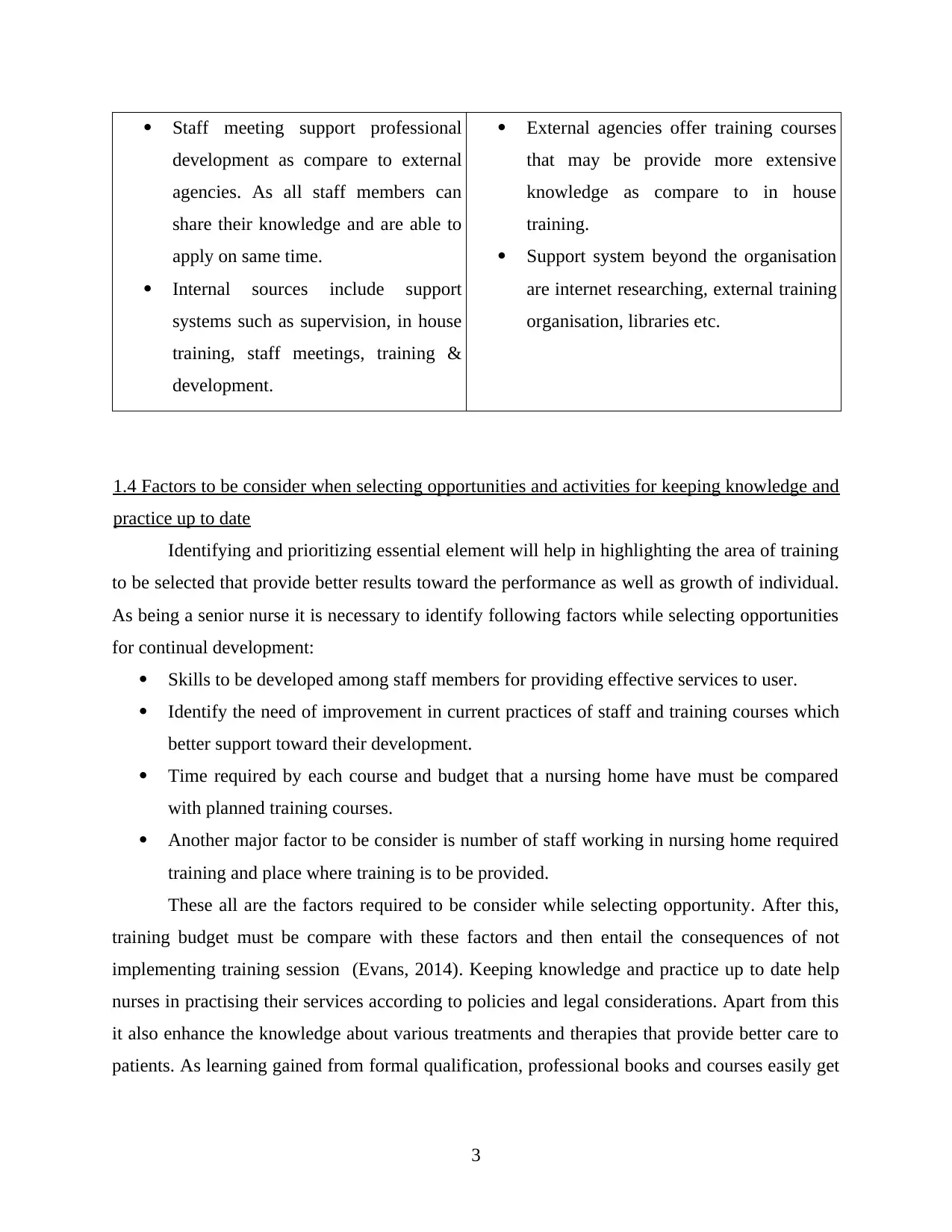
Staff meeting support professional
development as compare to external
agencies. As all staff members can
share their knowledge and are able to
apply on same time.
Internal sources include support
systems such as supervision, in house
training, staff meetings, training &
development.
External agencies offer training courses
that may be provide more extensive
knowledge as compare to in house
training.
Support system beyond the organisation
are internet researching, external training
organisation, libraries etc.
1.4 Factors to be consider when selecting opportunities and activities for keeping knowledge and
practice up to date
Identifying and prioritizing essential element will help in highlighting the area of training
to be selected that provide better results toward the performance as well as growth of individual.
As being a senior nurse it is necessary to identify following factors while selecting opportunities
for continual development:
Skills to be developed among staff members for providing effective services to user.
Identify the need of improvement in current practices of staff and training courses which
better support toward their development.
Time required by each course and budget that a nursing home have must be compared
with planned training courses.
Another major factor to be consider is number of staff working in nursing home required
training and place where training is to be provided.
These all are the factors required to be consider while selecting opportunity. After this,
training budget must be compare with these factors and then entail the consequences of not
implementing training session (Evans, 2014). Keeping knowledge and practice up to date help
nurses in practising their services according to policies and legal considerations. Apart from this
it also enhance the knowledge about various treatments and therapies that provide better care to
patients. As learning gained from formal qualification, professional books and courses easily get
3
development as compare to external
agencies. As all staff members can
share their knowledge and are able to
apply on same time.
Internal sources include support
systems such as supervision, in house
training, staff meetings, training &
development.
External agencies offer training courses
that may be provide more extensive
knowledge as compare to in house
training.
Support system beyond the organisation
are internet researching, external training
organisation, libraries etc.
1.4 Factors to be consider when selecting opportunities and activities for keeping knowledge and
practice up to date
Identifying and prioritizing essential element will help in highlighting the area of training
to be selected that provide better results toward the performance as well as growth of individual.
As being a senior nurse it is necessary to identify following factors while selecting opportunities
for continual development:
Skills to be developed among staff members for providing effective services to user.
Identify the need of improvement in current practices of staff and training courses which
better support toward their development.
Time required by each course and budget that a nursing home have must be compared
with planned training courses.
Another major factor to be consider is number of staff working in nursing home required
training and place where training is to be provided.
These all are the factors required to be consider while selecting opportunity. After this,
training budget must be compare with these factors and then entail the consequences of not
implementing training session (Evans, 2014). Keeping knowledge and practice up to date help
nurses in practising their services according to policies and legal considerations. Apart from this
it also enhance the knowledge about various treatments and therapies that provide better care to
patients. As learning gained from formal qualification, professional books and courses easily get
3
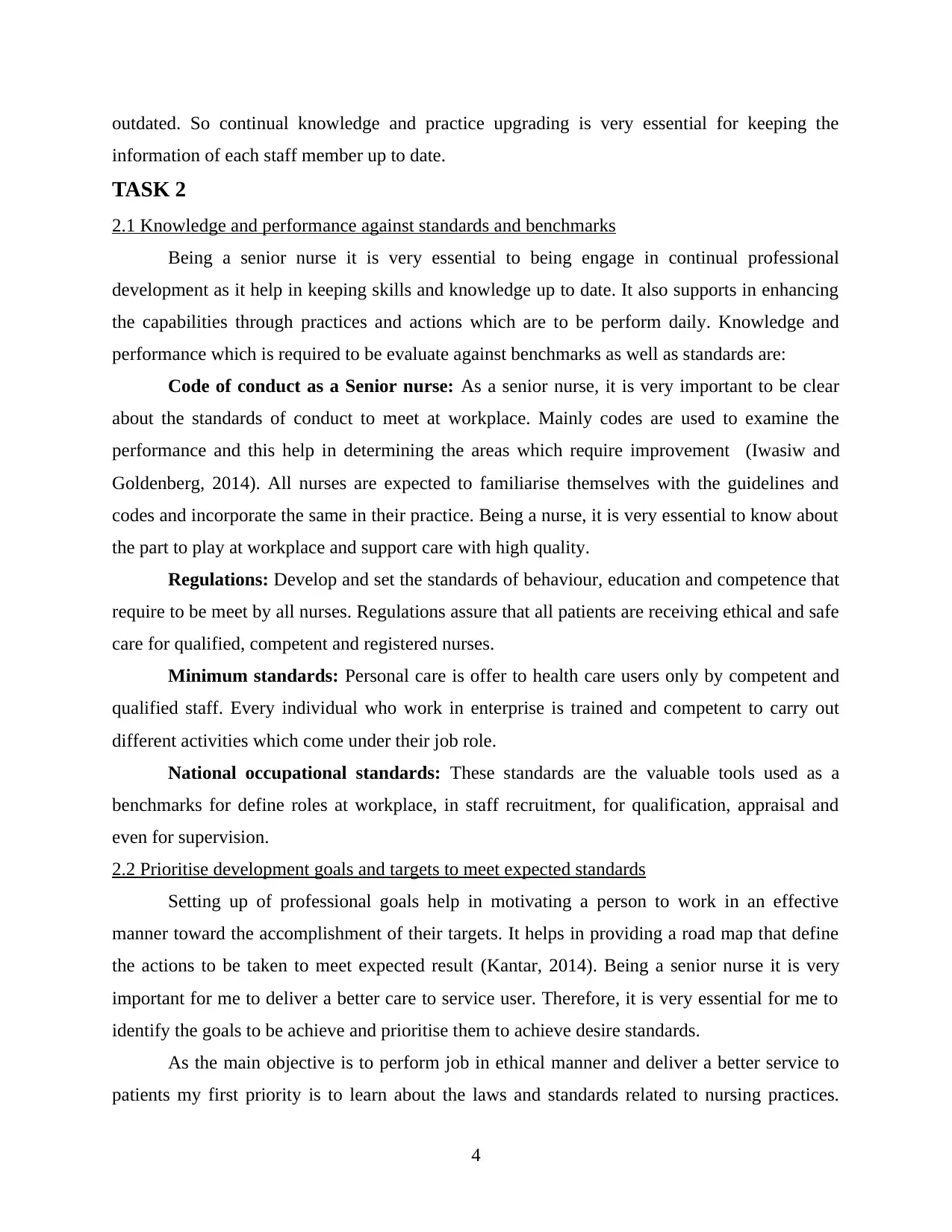
outdated. So continual knowledge and practice upgrading is very essential for keeping the
information of each staff member up to date.
TASK 2
2.1 Knowledge and performance against standards and benchmarks
Being a senior nurse it is very essential to being engage in continual professional
development as it help in keeping skills and knowledge up to date. It also supports in enhancing
the capabilities through practices and actions which are to be perform daily. Knowledge and
performance which is required to be evaluate against benchmarks as well as standards are:
Code of conduct as a Senior nurse: As a senior nurse, it is very important to be clear
about the standards of conduct to meet at workplace. Mainly codes are used to examine the
performance and this help in determining the areas which require improvement (Iwasiw and
Goldenberg, 2014). All nurses are expected to familiarise themselves with the guidelines and
codes and incorporate the same in their practice. Being a nurse, it is very essential to know about
the part to play at workplace and support care with high quality.
Regulations: Develop and set the standards of behaviour, education and competence that
require to be meet by all nurses. Regulations assure that all patients are receiving ethical and safe
care for qualified, competent and registered nurses.
Minimum standards: Personal care is offer to health care users only by competent and
qualified staff. Every individual who work in enterprise is trained and competent to carry out
different activities which come under their job role.
National occupational standards: These standards are the valuable tools used as a
benchmarks for define roles at workplace, in staff recruitment, for qualification, appraisal and
even for supervision.
2.2 Prioritise development goals and targets to meet expected standards
Setting up of professional goals help in motivating a person to work in an effective
manner toward the accomplishment of their targets. It helps in providing a road map that define
the actions to be taken to meet expected result (Kantar, 2014). Being a senior nurse it is very
important for me to deliver a better care to service user. Therefore, it is very essential for me to
identify the goals to be achieve and prioritise them to achieve desire standards.
As the main objective is to perform job in ethical manner and deliver a better service to
patients my first priority is to learn about the laws and standards related to nursing practices.
4
information of each staff member up to date.
TASK 2
2.1 Knowledge and performance against standards and benchmarks
Being a senior nurse it is very essential to being engage in continual professional
development as it help in keeping skills and knowledge up to date. It also supports in enhancing
the capabilities through practices and actions which are to be perform daily. Knowledge and
performance which is required to be evaluate against benchmarks as well as standards are:
Code of conduct as a Senior nurse: As a senior nurse, it is very important to be clear
about the standards of conduct to meet at workplace. Mainly codes are used to examine the
performance and this help in determining the areas which require improvement (Iwasiw and
Goldenberg, 2014). All nurses are expected to familiarise themselves with the guidelines and
codes and incorporate the same in their practice. Being a nurse, it is very essential to know about
the part to play at workplace and support care with high quality.
Regulations: Develop and set the standards of behaviour, education and competence that
require to be meet by all nurses. Regulations assure that all patients are receiving ethical and safe
care for qualified, competent and registered nurses.
Minimum standards: Personal care is offer to health care users only by competent and
qualified staff. Every individual who work in enterprise is trained and competent to carry out
different activities which come under their job role.
National occupational standards: These standards are the valuable tools used as a
benchmarks for define roles at workplace, in staff recruitment, for qualification, appraisal and
even for supervision.
2.2 Prioritise development goals and targets to meet expected standards
Setting up of professional goals help in motivating a person to work in an effective
manner toward the accomplishment of their targets. It helps in providing a road map that define
the actions to be taken to meet expected result (Kantar, 2014). Being a senior nurse it is very
important for me to deliver a better care to service user. Therefore, it is very essential for me to
identify the goals to be achieve and prioritise them to achieve desire standards.
As the main objective is to perform job in ethical manner and deliver a better service to
patients my first priority is to learn about the laws and standards related to nursing practices.
4
⊘ This is a preview!⊘
Do you want full access?
Subscribe today to unlock all pages.

Trusted by 1+ million students worldwide
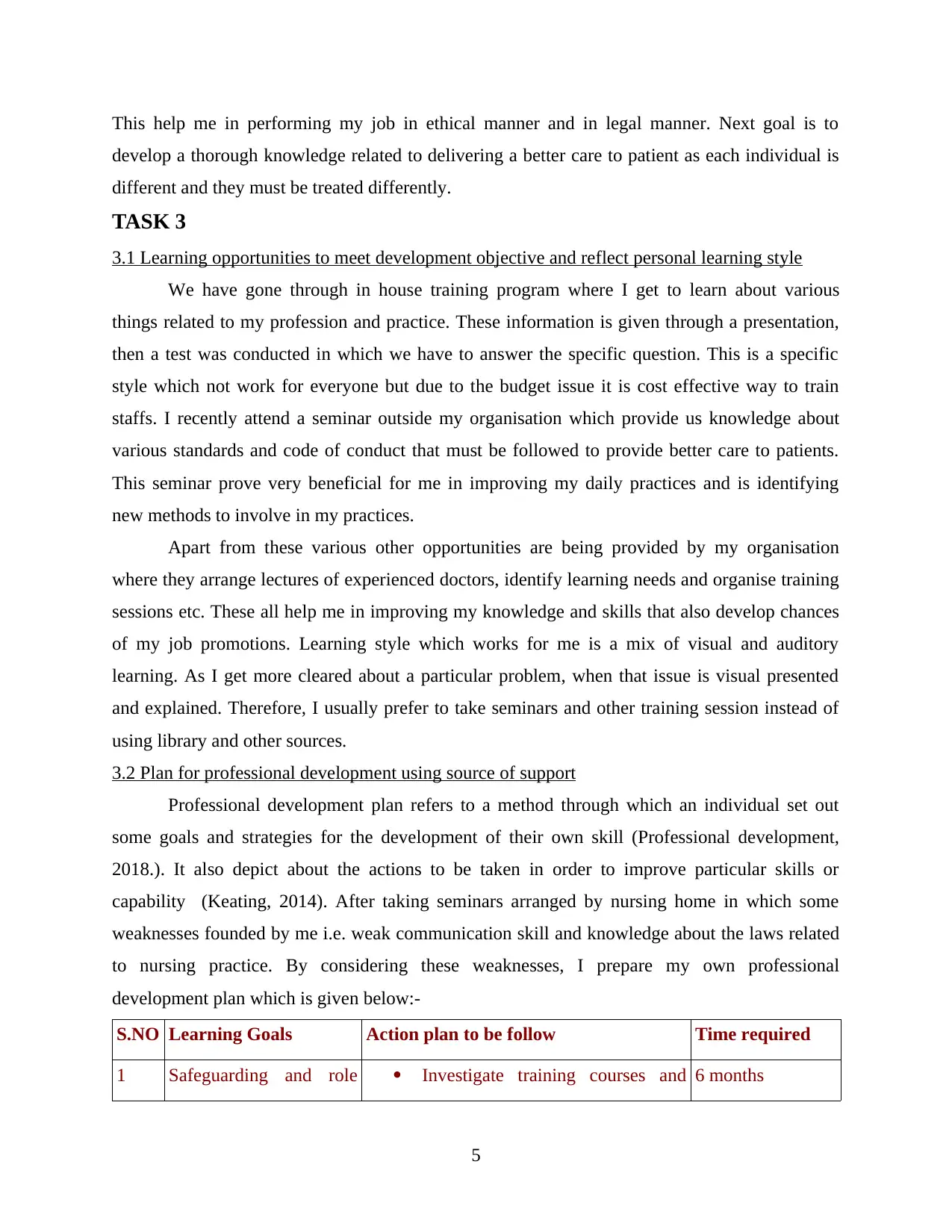
This help me in performing my job in ethical manner and in legal manner. Next goal is to
develop a thorough knowledge related to delivering a better care to patient as each individual is
different and they must be treated differently.
TASK 3
3.1 Learning opportunities to meet development objective and reflect personal learning style
We have gone through in house training program where I get to learn about various
things related to my profession and practice. These information is given through a presentation,
then a test was conducted in which we have to answer the specific question. This is a specific
style which not work for everyone but due to the budget issue it is cost effective way to train
staffs. I recently attend a seminar outside my organisation which provide us knowledge about
various standards and code of conduct that must be followed to provide better care to patients.
This seminar prove very beneficial for me in improving my daily practices and is identifying
new methods to involve in my practices.
Apart from these various other opportunities are being provided by my organisation
where they arrange lectures of experienced doctors, identify learning needs and organise training
sessions etc. These all help me in improving my knowledge and skills that also develop chances
of my job promotions. Learning style which works for me is a mix of visual and auditory
learning. As I get more cleared about a particular problem, when that issue is visual presented
and explained. Therefore, I usually prefer to take seminars and other training session instead of
using library and other sources.
3.2 Plan for professional development using source of support
Professional development plan refers to a method through which an individual set out
some goals and strategies for the development of their own skill (Professional development,
2018.). It also depict about the actions to be taken in order to improve particular skills or
capability (Keating, 2014). After taking seminars arranged by nursing home in which some
weaknesses founded by me i.e. weak communication skill and knowledge about the laws related
to nursing practice. By considering these weaknesses, I prepare my own professional
development plan which is given below:-
S.NO Learning Goals Action plan to be follow Time required
1 Safeguarding and role Investigate training courses and 6 months
5
develop a thorough knowledge related to delivering a better care to patient as each individual is
different and they must be treated differently.
TASK 3
3.1 Learning opportunities to meet development objective and reflect personal learning style
We have gone through in house training program where I get to learn about various
things related to my profession and practice. These information is given through a presentation,
then a test was conducted in which we have to answer the specific question. This is a specific
style which not work for everyone but due to the budget issue it is cost effective way to train
staffs. I recently attend a seminar outside my organisation which provide us knowledge about
various standards and code of conduct that must be followed to provide better care to patients.
This seminar prove very beneficial for me in improving my daily practices and is identifying
new methods to involve in my practices.
Apart from these various other opportunities are being provided by my organisation
where they arrange lectures of experienced doctors, identify learning needs and organise training
sessions etc. These all help me in improving my knowledge and skills that also develop chances
of my job promotions. Learning style which works for me is a mix of visual and auditory
learning. As I get more cleared about a particular problem, when that issue is visual presented
and explained. Therefore, I usually prefer to take seminars and other training session instead of
using library and other sources.
3.2 Plan for professional development using source of support
Professional development plan refers to a method through which an individual set out
some goals and strategies for the development of their own skill (Professional development,
2018.). It also depict about the actions to be taken in order to improve particular skills or
capability (Keating, 2014). After taking seminars arranged by nursing home in which some
weaknesses founded by me i.e. weak communication skill and knowledge about the laws related
to nursing practice. By considering these weaknesses, I prepare my own professional
development plan which is given below:-
S.NO Learning Goals Action plan to be follow Time required
1 Safeguarding and role Investigate training courses and 6 months
5
Paraphrase This Document
Need a fresh take? Get an instant paraphrase of this document with our AI Paraphraser
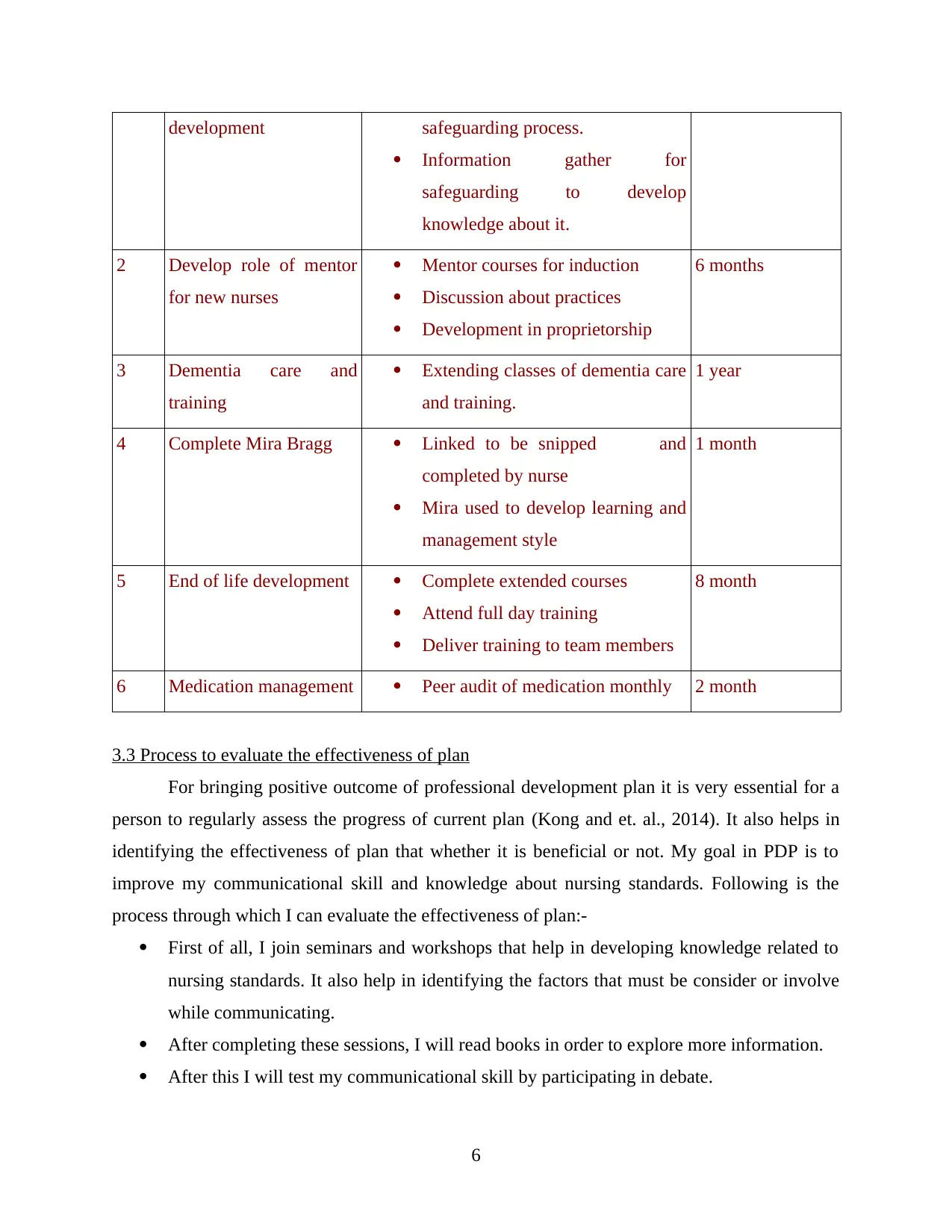
development safeguarding process.
Information gather for
safeguarding to develop
knowledge about it.
2 Develop role of mentor
for new nurses
Mentor courses for induction
Discussion about practices
Development in proprietorship
6 months
3 Dementia care and
training
Extending classes of dementia care
and training.
1 year
4 Complete Mira Bragg Linked to be snipped and
completed by nurse
Mira used to develop learning and
management style
1 month
5 End of life development Complete extended courses
Attend full day training
Deliver training to team members
8 month
6 Medication management Peer audit of medication monthly 2 month
3.3 Process to evaluate the effectiveness of plan
For bringing positive outcome of professional development plan it is very essential for a
person to regularly assess the progress of current plan (Kong and et. al., 2014). It also helps in
identifying the effectiveness of plan that whether it is beneficial or not. My goal in PDP is to
improve my communicational skill and knowledge about nursing standards. Following is the
process through which I can evaluate the effectiveness of plan:-
First of all, I join seminars and workshops that help in developing knowledge related to
nursing standards. It also help in identifying the factors that must be consider or involve
while communicating.
After completing these sessions, I will read books in order to explore more information.
After this I will test my communicational skill by participating in debate.
6
Information gather for
safeguarding to develop
knowledge about it.
2 Develop role of mentor
for new nurses
Mentor courses for induction
Discussion about practices
Development in proprietorship
6 months
3 Dementia care and
training
Extending classes of dementia care
and training.
1 year
4 Complete Mira Bragg Linked to be snipped and
completed by nurse
Mira used to develop learning and
management style
1 month
5 End of life development Complete extended courses
Attend full day training
Deliver training to team members
8 month
6 Medication management Peer audit of medication monthly 2 month
3.3 Process to evaluate the effectiveness of plan
For bringing positive outcome of professional development plan it is very essential for a
person to regularly assess the progress of current plan (Kong and et. al., 2014). It also helps in
identifying the effectiveness of plan that whether it is beneficial or not. My goal in PDP is to
improve my communicational skill and knowledge about nursing standards. Following is the
process through which I can evaluate the effectiveness of plan:-
First of all, I join seminars and workshops that help in developing knowledge related to
nursing standards. It also help in identifying the factors that must be consider or involve
while communicating.
After completing these sessions, I will read books in order to explore more information.
After this I will test my communicational skill by participating in debate.
6
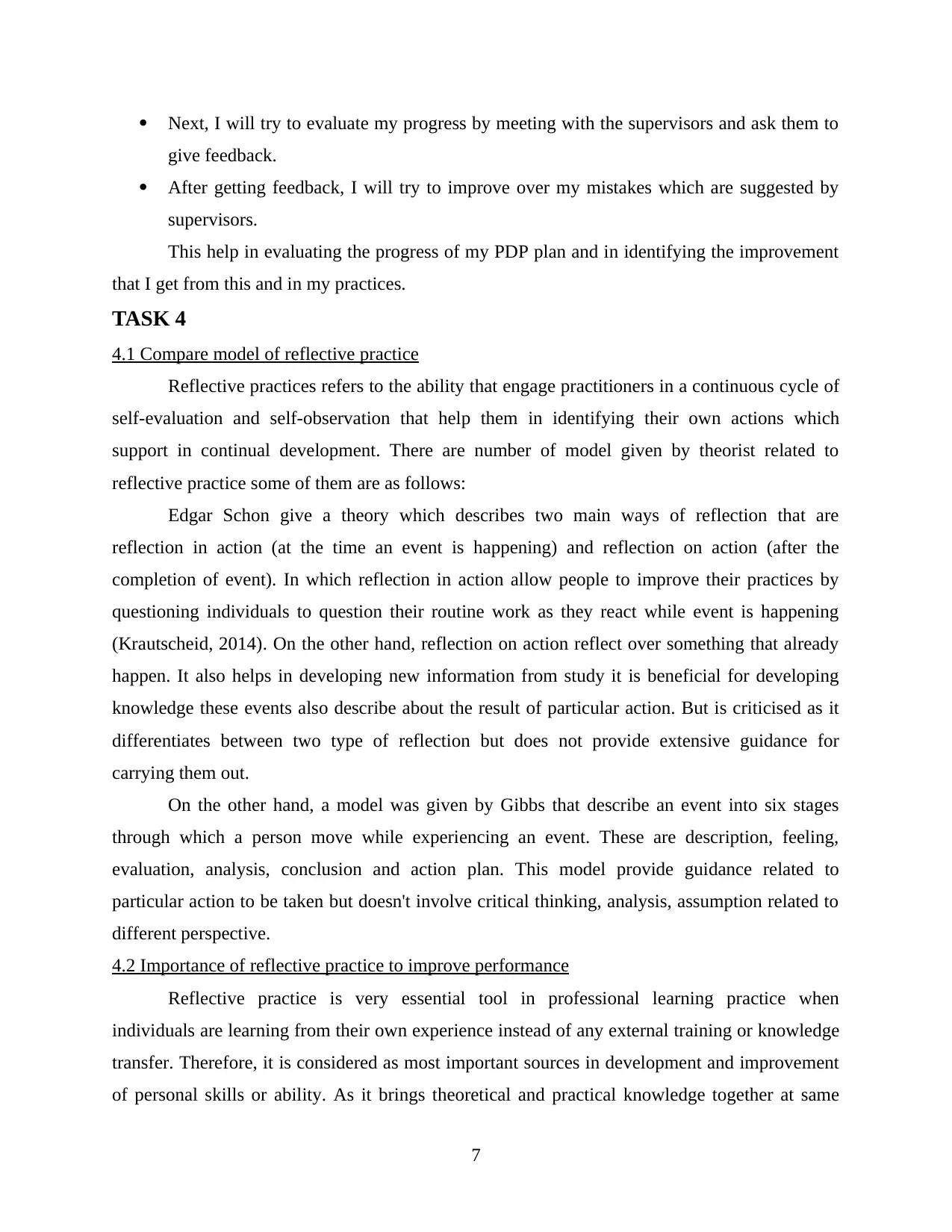
Next, I will try to evaluate my progress by meeting with the supervisors and ask them to
give feedback.
After getting feedback, I will try to improve over my mistakes which are suggested by
supervisors.
This help in evaluating the progress of my PDP plan and in identifying the improvement
that I get from this and in my practices.
TASK 4
4.1 Compare model of reflective practice
Reflective practices refers to the ability that engage practitioners in a continuous cycle of
self-evaluation and self-observation that help them in identifying their own actions which
support in continual development. There are number of model given by theorist related to
reflective practice some of them are as follows:
Edgar Schon give a theory which describes two main ways of reflection that are
reflection in action (at the time an event is happening) and reflection on action (after the
completion of event). In which reflection in action allow people to improve their practices by
questioning individuals to question their routine work as they react while event is happening
(Krautscheid, 2014). On the other hand, reflection on action reflect over something that already
happen. It also helps in developing new information from study it is beneficial for developing
knowledge these events also describe about the result of particular action. But is criticised as it
differentiates between two type of reflection but does not provide extensive guidance for
carrying them out.
On the other hand, a model was given by Gibbs that describe an event into six stages
through which a person move while experiencing an event. These are description, feeling,
evaluation, analysis, conclusion and action plan. This model provide guidance related to
particular action to be taken but doesn't involve critical thinking, analysis, assumption related to
different perspective.
4.2 Importance of reflective practice to improve performance
Reflective practice is very essential tool in professional learning practice when
individuals are learning from their own experience instead of any external training or knowledge
transfer. Therefore, it is considered as most important sources in development and improvement
of personal skills or ability. As it brings theoretical and practical knowledge together at same
7
give feedback.
After getting feedback, I will try to improve over my mistakes which are suggested by
supervisors.
This help in evaluating the progress of my PDP plan and in identifying the improvement
that I get from this and in my practices.
TASK 4
4.1 Compare model of reflective practice
Reflective practices refers to the ability that engage practitioners in a continuous cycle of
self-evaluation and self-observation that help them in identifying their own actions which
support in continual development. There are number of model given by theorist related to
reflective practice some of them are as follows:
Edgar Schon give a theory which describes two main ways of reflection that are
reflection in action (at the time an event is happening) and reflection on action (after the
completion of event). In which reflection in action allow people to improve their practices by
questioning individuals to question their routine work as they react while event is happening
(Krautscheid, 2014). On the other hand, reflection on action reflect over something that already
happen. It also helps in developing new information from study it is beneficial for developing
knowledge these events also describe about the result of particular action. But is criticised as it
differentiates between two type of reflection but does not provide extensive guidance for
carrying them out.
On the other hand, a model was given by Gibbs that describe an event into six stages
through which a person move while experiencing an event. These are description, feeling,
evaluation, analysis, conclusion and action plan. This model provide guidance related to
particular action to be taken but doesn't involve critical thinking, analysis, assumption related to
different perspective.
4.2 Importance of reflective practice to improve performance
Reflective practice is very essential tool in professional learning practice when
individuals are learning from their own experience instead of any external training or knowledge
transfer. Therefore, it is considered as most important sources in development and improvement
of personal skills or ability. As it brings theoretical and practical knowledge together at same
7
⊘ This is a preview!⊘
Do you want full access?
Subscribe today to unlock all pages.

Trusted by 1+ million students worldwide
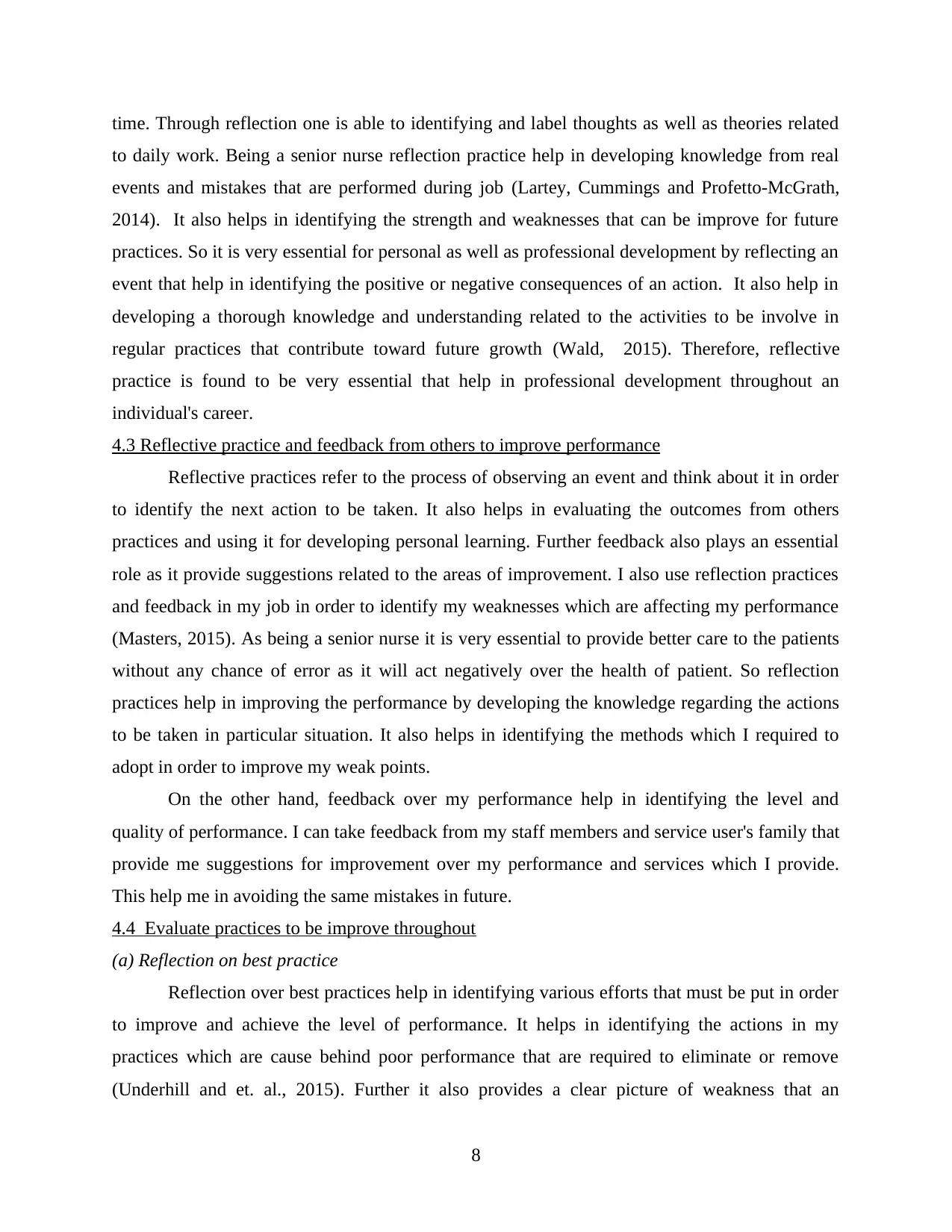
time. Through reflection one is able to identifying and label thoughts as well as theories related
to daily work. Being a senior nurse reflection practice help in developing knowledge from real
events and mistakes that are performed during job (Lartey, Cummings and Profetto‐McGrath,
2014). It also helps in identifying the strength and weaknesses that can be improve for future
practices. So it is very essential for personal as well as professional development by reflecting an
event that help in identifying the positive or negative consequences of an action. It also help in
developing a thorough knowledge and understanding related to the activities to be involve in
regular practices that contribute toward future growth (Wald, 2015). Therefore, reflective
practice is found to be very essential that help in professional development throughout an
individual's career.
4.3 Reflective practice and feedback from others to improve performance
Reflective practices refer to the process of observing an event and think about it in order
to identify the next action to be taken. It also helps in evaluating the outcomes from others
practices and using it for developing personal learning. Further feedback also plays an essential
role as it provide suggestions related to the areas of improvement. I also use reflection practices
and feedback in my job in order to identify my weaknesses which are affecting my performance
(Masters, 2015). As being a senior nurse it is very essential to provide better care to the patients
without any chance of error as it will act negatively over the health of patient. So reflection
practices help in improving the performance by developing the knowledge regarding the actions
to be taken in particular situation. It also helps in identifying the methods which I required to
adopt in order to improve my weak points.
On the other hand, feedback over my performance help in identifying the level and
quality of performance. I can take feedback from my staff members and service user's family that
provide me suggestions for improvement over my performance and services which I provide.
This help me in avoiding the same mistakes in future.
4.4 Evaluate practices to be improve throughout
(a) Reflection on best practice
Reflection over best practices help in identifying various efforts that must be put in order
to improve and achieve the level of performance. It helps in identifying the actions in my
practices which are cause behind poor performance that are required to eliminate or remove
(Underhill and et. al., 2015). Further it also provides a clear picture of weakness that an
8
to daily work. Being a senior nurse reflection practice help in developing knowledge from real
events and mistakes that are performed during job (Lartey, Cummings and Profetto‐McGrath,
2014). It also helps in identifying the strength and weaknesses that can be improve for future
practices. So it is very essential for personal as well as professional development by reflecting an
event that help in identifying the positive or negative consequences of an action. It also help in
developing a thorough knowledge and understanding related to the activities to be involve in
regular practices that contribute toward future growth (Wald, 2015). Therefore, reflective
practice is found to be very essential that help in professional development throughout an
individual's career.
4.3 Reflective practice and feedback from others to improve performance
Reflective practices refer to the process of observing an event and think about it in order
to identify the next action to be taken. It also helps in evaluating the outcomes from others
practices and using it for developing personal learning. Further feedback also plays an essential
role as it provide suggestions related to the areas of improvement. I also use reflection practices
and feedback in my job in order to identify my weaknesses which are affecting my performance
(Masters, 2015). As being a senior nurse it is very essential to provide better care to the patients
without any chance of error as it will act negatively over the health of patient. So reflection
practices help in improving the performance by developing the knowledge regarding the actions
to be taken in particular situation. It also helps in identifying the methods which I required to
adopt in order to improve my weak points.
On the other hand, feedback over my performance help in identifying the level and
quality of performance. I can take feedback from my staff members and service user's family that
provide me suggestions for improvement over my performance and services which I provide.
This help me in avoiding the same mistakes in future.
4.4 Evaluate practices to be improve throughout
(a) Reflection on best practice
Reflection over best practices help in identifying various efforts that must be put in order
to improve and achieve the level of performance. It helps in identifying the actions in my
practices which are cause behind poor performance that are required to eliminate or remove
(Underhill and et. al., 2015). Further it also provides a clear picture of weakness that an
8
Paraphrase This Document
Need a fresh take? Get an instant paraphrase of this document with our AI Paraphraser
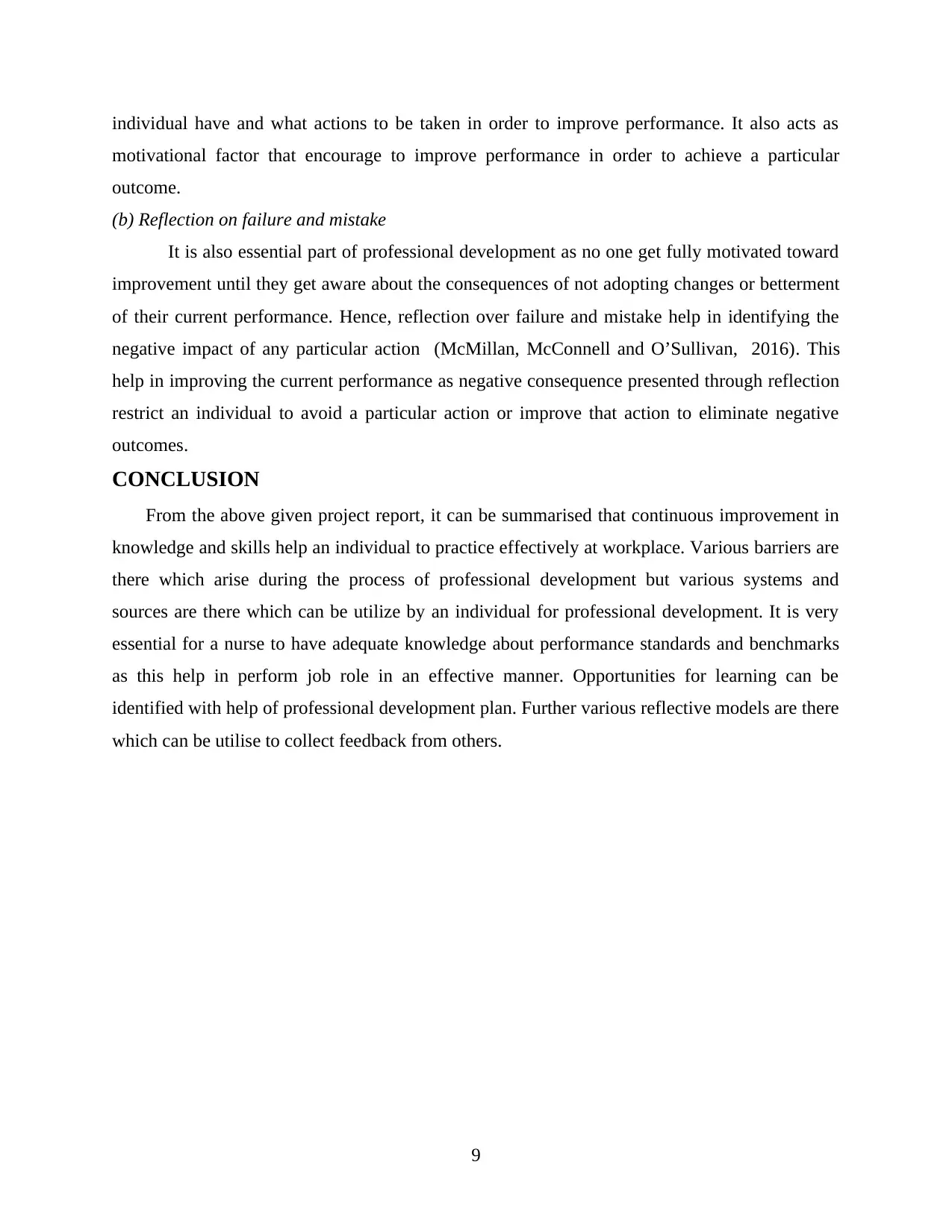
individual have and what actions to be taken in order to improve performance. It also acts as
motivational factor that encourage to improve performance in order to achieve a particular
outcome.
(b) Reflection on failure and mistake
It is also essential part of professional development as no one get fully motivated toward
improvement until they get aware about the consequences of not adopting changes or betterment
of their current performance. Hence, reflection over failure and mistake help in identifying the
negative impact of any particular action (McMillan, McConnell and O’Sullivan, 2016). This
help in improving the current performance as negative consequence presented through reflection
restrict an individual to avoid a particular action or improve that action to eliminate negative
outcomes.
CONCLUSION
From the above given project report, it can be summarised that continuous improvement in
knowledge and skills help an individual to practice effectively at workplace. Various barriers are
there which arise during the process of professional development but various systems and
sources are there which can be utilize by an individual for professional development. It is very
essential for a nurse to have adequate knowledge about performance standards and benchmarks
as this help in perform job role in an effective manner. Opportunities for learning can be
identified with help of professional development plan. Further various reflective models are there
which can be utilise to collect feedback from others.
9
motivational factor that encourage to improve performance in order to achieve a particular
outcome.
(b) Reflection on failure and mistake
It is also essential part of professional development as no one get fully motivated toward
improvement until they get aware about the consequences of not adopting changes or betterment
of their current performance. Hence, reflection over failure and mistake help in identifying the
negative impact of any particular action (McMillan, McConnell and O’Sullivan, 2016). This
help in improving the current performance as negative consequence presented through reflection
restrict an individual to avoid a particular action or improve that action to eliminate negative
outcomes.
CONCLUSION
From the above given project report, it can be summarised that continuous improvement in
knowledge and skills help an individual to practice effectively at workplace. Various barriers are
there which arise during the process of professional development but various systems and
sources are there which can be utilize by an individual for professional development. It is very
essential for a nurse to have adequate knowledge about performance standards and benchmarks
as this help in perform job role in an effective manner. Opportunities for learning can be
identified with help of professional development plan. Further various reflective models are there
which can be utilise to collect feedback from others.
9
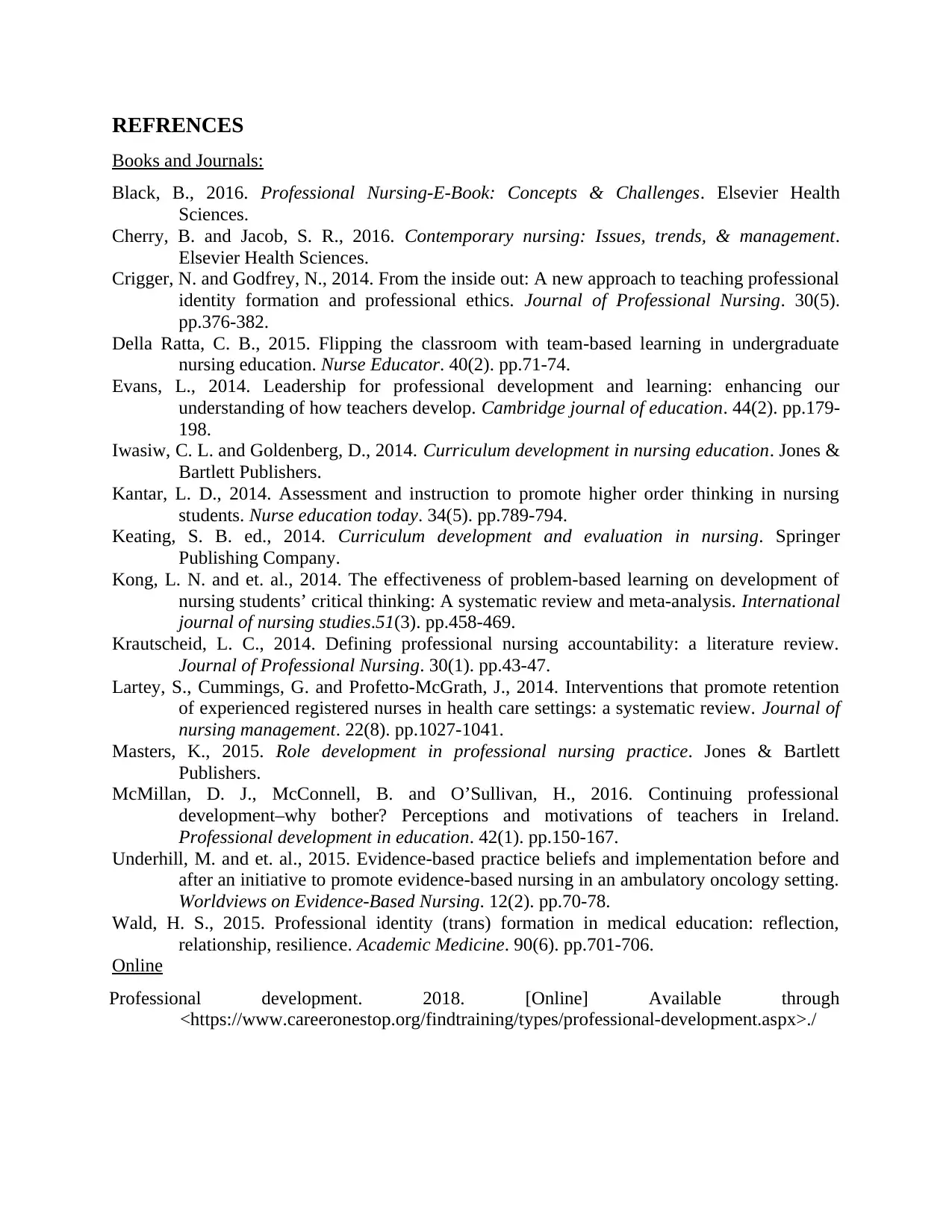
REFRENCES
Books and Journals:
Black, B., 2016. Professional Nursing-E-Book: Concepts & Challenges. Elsevier Health
Sciences.
Cherry, B. and Jacob, S. R., 2016. Contemporary nursing: Issues, trends, & management.
Elsevier Health Sciences.
Crigger, N. and Godfrey, N., 2014. From the inside out: A new approach to teaching professional
identity formation and professional ethics. Journal of Professional Nursing. 30(5).
pp.376-382.
Della Ratta, C. B., 2015. Flipping the classroom with team-based learning in undergraduate
nursing education. Nurse Educator. 40(2). pp.71-74.
Evans, L., 2014. Leadership for professional development and learning: enhancing our
understanding of how teachers develop. Cambridge journal of education. 44(2). pp.179-
198.
Iwasiw, C. L. and Goldenberg, D., 2014. Curriculum development in nursing education. Jones &
Bartlett Publishers.
Kantar, L. D., 2014. Assessment and instruction to promote higher order thinking in nursing
students. Nurse education today. 34(5). pp.789-794.
Keating, S. B. ed., 2014. Curriculum development and evaluation in nursing. Springer
Publishing Company.
Kong, L. N. and et. al., 2014. The effectiveness of problem-based learning on development of
nursing students’ critical thinking: A systematic review and meta-analysis. International
journal of nursing studies.51(3). pp.458-469.
Krautscheid, L. C., 2014. Defining professional nursing accountability: a literature review.
Journal of Professional Nursing. 30(1). pp.43-47.
Lartey, S., Cummings, G. and Profetto‐McGrath, J., 2014. Interventions that promote retention
of experienced registered nurses in health care settings: a systematic review. Journal of
nursing management. 22(8). pp.1027-1041.
Masters, K., 2015. Role development in professional nursing practice. Jones & Bartlett
Publishers.
McMillan, D. J., McConnell, B. and O’Sullivan, H., 2016. Continuing professional
development–why bother? Perceptions and motivations of teachers in Ireland.
Professional development in education. 42(1). pp.150-167.
Underhill, M. and et. al., 2015. Evidence‐based practice beliefs and implementation before and
after an initiative to promote evidence‐based nursing in an ambulatory oncology setting.
Worldviews on Evidence‐Based Nursing. 12(2). pp.70-78.
Wald, H. S., 2015. Professional identity (trans) formation in medical education: reflection,
relationship, resilience. Academic Medicine. 90(6). pp.701-706.
Online
Professional development. 2018. [Online] Available through
<https://www.careeronestop.org/findtraining/types/professional-development.aspx>./
Books and Journals:
Black, B., 2016. Professional Nursing-E-Book: Concepts & Challenges. Elsevier Health
Sciences.
Cherry, B. and Jacob, S. R., 2016. Contemporary nursing: Issues, trends, & management.
Elsevier Health Sciences.
Crigger, N. and Godfrey, N., 2014. From the inside out: A new approach to teaching professional
identity formation and professional ethics. Journal of Professional Nursing. 30(5).
pp.376-382.
Della Ratta, C. B., 2015. Flipping the classroom with team-based learning in undergraduate
nursing education. Nurse Educator. 40(2). pp.71-74.
Evans, L., 2014. Leadership for professional development and learning: enhancing our
understanding of how teachers develop. Cambridge journal of education. 44(2). pp.179-
198.
Iwasiw, C. L. and Goldenberg, D., 2014. Curriculum development in nursing education. Jones &
Bartlett Publishers.
Kantar, L. D., 2014. Assessment and instruction to promote higher order thinking in nursing
students. Nurse education today. 34(5). pp.789-794.
Keating, S. B. ed., 2014. Curriculum development and evaluation in nursing. Springer
Publishing Company.
Kong, L. N. and et. al., 2014. The effectiveness of problem-based learning on development of
nursing students’ critical thinking: A systematic review and meta-analysis. International
journal of nursing studies.51(3). pp.458-469.
Krautscheid, L. C., 2014. Defining professional nursing accountability: a literature review.
Journal of Professional Nursing. 30(1). pp.43-47.
Lartey, S., Cummings, G. and Profetto‐McGrath, J., 2014. Interventions that promote retention
of experienced registered nurses in health care settings: a systematic review. Journal of
nursing management. 22(8). pp.1027-1041.
Masters, K., 2015. Role development in professional nursing practice. Jones & Bartlett
Publishers.
McMillan, D. J., McConnell, B. and O’Sullivan, H., 2016. Continuing professional
development–why bother? Perceptions and motivations of teachers in Ireland.
Professional development in education. 42(1). pp.150-167.
Underhill, M. and et. al., 2015. Evidence‐based practice beliefs and implementation before and
after an initiative to promote evidence‐based nursing in an ambulatory oncology setting.
Worldviews on Evidence‐Based Nursing. 12(2). pp.70-78.
Wald, H. S., 2015. Professional identity (trans) formation in medical education: reflection,
relationship, resilience. Academic Medicine. 90(6). pp.701-706.
Online
Professional development. 2018. [Online] Available through
<https://www.careeronestop.org/findtraining/types/professional-development.aspx>./
⊘ This is a preview!⊘
Do you want full access?
Subscribe today to unlock all pages.

Trusted by 1+ million students worldwide
1 out of 12
Related Documents
Your All-in-One AI-Powered Toolkit for Academic Success.
+13062052269
info@desklib.com
Available 24*7 on WhatsApp / Email
![[object Object]](/_next/static/media/star-bottom.7253800d.svg)
Unlock your academic potential
Copyright © 2020–2026 A2Z Services. All Rights Reserved. Developed and managed by ZUCOL.



